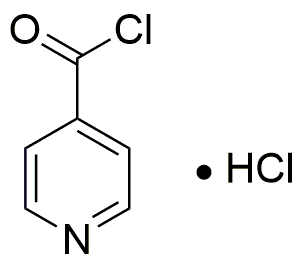Isonicotinoyl chloride hydrochloride is widely utilized in research focused on:
- Synthesis of Pharmaceuticals: This compound is a key intermediate in the synthesis of various pharmaceuticals, particularly in the production of anti-tuberculosis agents. Its ability to introduce a chlorocarbonyl group makes it valuable for creating complex medicinal compounds.
- Development of Agrochemicals: It plays a significant role in the formulation of agrochemicals, contributing to the development of pesticides and herbicides that are more effective and environmentally friendly.
- Research in Organic Chemistry: Used extensively in organic synthesis, it helps researchers create novel compounds for academic studies, enhancing the understanding of chemical reactivity and mechanisms.
- Bioconjugation Applications: The compound is utilized in bioconjugation processes, allowing for the attachment of biomolecules to surfaces or other molecules, which is crucial in drug delivery systems and diagnostic tools.
- Material Science: Its properties are leveraged in the development of new materials, including polymers and coatings, that require specific chemical functionalities for enhanced performance.
General Information
Properties
Safety and Regulations
Applications
Isonicotinoyl chloride hydrochloride is widely utilized in research focused on:
- Synthesis of Pharmaceuticals: This compound is a key intermediate in the synthesis of various pharmaceuticals, particularly in the production of anti-tuberculosis agents. Its ability to introduce a chlorocarbonyl group makes it valuable for creating complex medicinal compounds.
- Development of Agrochemicals: It plays a significant role in the formulation of agrochemicals, contributing to the development of pesticides and herbicides that are more effective and environmentally friendly.
- Research in Organic Chemistry: Used extensively in organic synthesis, it helps researchers create novel compounds for academic studies, enhancing the understanding of chemical reactivity and mechanisms.
- Bioconjugation Applications: The compound is utilized in bioconjugation processes, allowing for the attachment of biomolecules to surfaces or other molecules, which is crucial in drug delivery systems and diagnostic tools.
- Material Science: Its properties are leveraged in the development of new materials, including polymers and coatings, that require specific chemical functionalities for enhanced performance.
Documents
Safety Data Sheets (SDS)
The SDS provides comprehensive safety information on handling, storage, and disposal of the product.
Product Specification (PS)
The PS provides a comprehensive breakdown of the product’s properties, including chemical composition, physical state, purity, and storage requirements. It also details acceptable quality ranges and the product's intended applications.
Certificates of Analysis (COA)
Search for Certificates of Analysis (COA) by entering the products Lot Number. Lot and Batch Numbers can be found on a product’s label following the words ‘Lot’ or ‘Batch’.
*Catalog Number
*Lot Number
Certificates Of Origin (COO)
This COO confirms the country where the product was manufactured, and also details the materials and components used in it and whether it is derived from natural, synthetic, or other specific sources. This certificate may be required for customs, trade, and regulatory compliance.
*Catalog Number
*Lot Number
Safety Data Sheets (SDS)
The SDS provides comprehensive safety information on handling, storage, and disposal of the product.
DownloadProduct Specification (PS)
The PS provides a comprehensive breakdown of the product’s properties, including chemical composition, physical state, purity, and storage requirements. It also details acceptable quality ranges and the product's intended applications.
DownloadCertificates of Analysis (COA)
Search for Certificates of Analysis (COA) by entering the products Lot Number. Lot and Batch Numbers can be found on a product’s label following the words ‘Lot’ or ‘Batch’.
*Catalog Number
*Lot Number
Certificates Of Origin (COO)
This COO confirms the country where the product was manufactured, and also details the materials and components used in it and whether it is derived from natural, synthetic, or other specific sources. This certificate may be required for customs, trade, and regulatory compliance.


